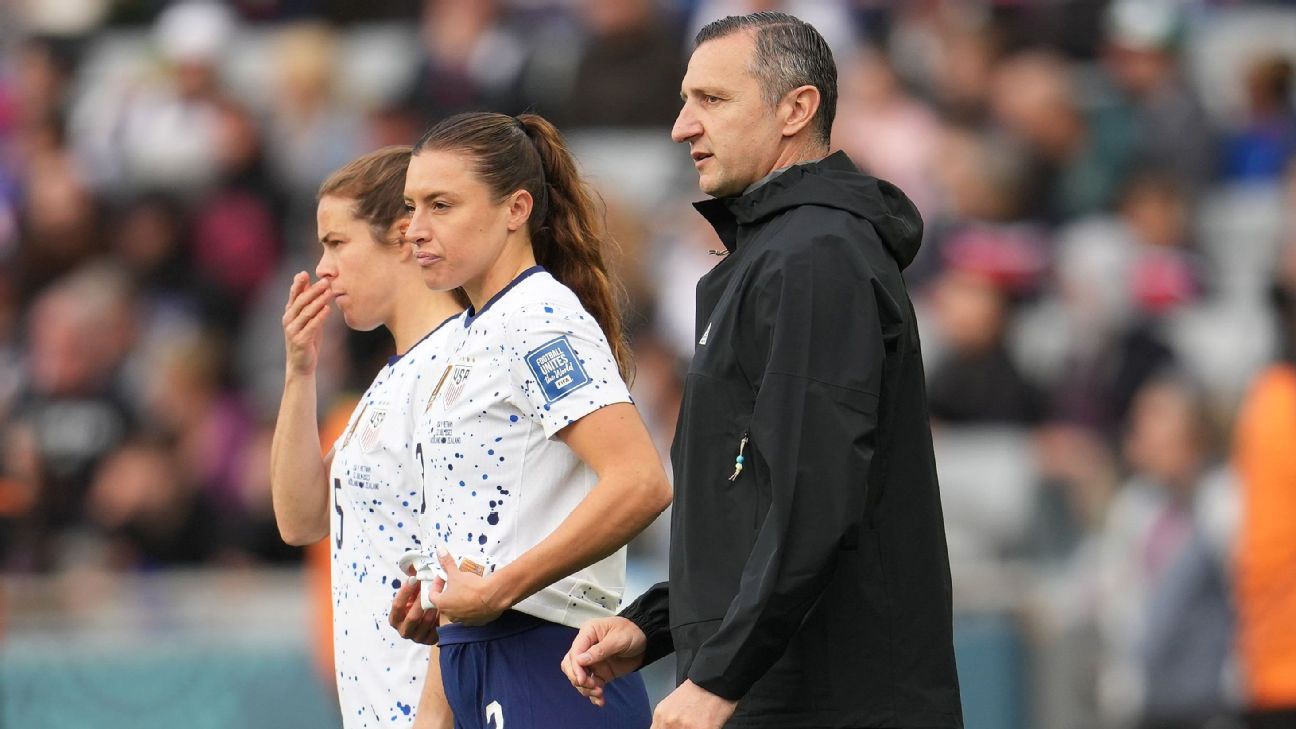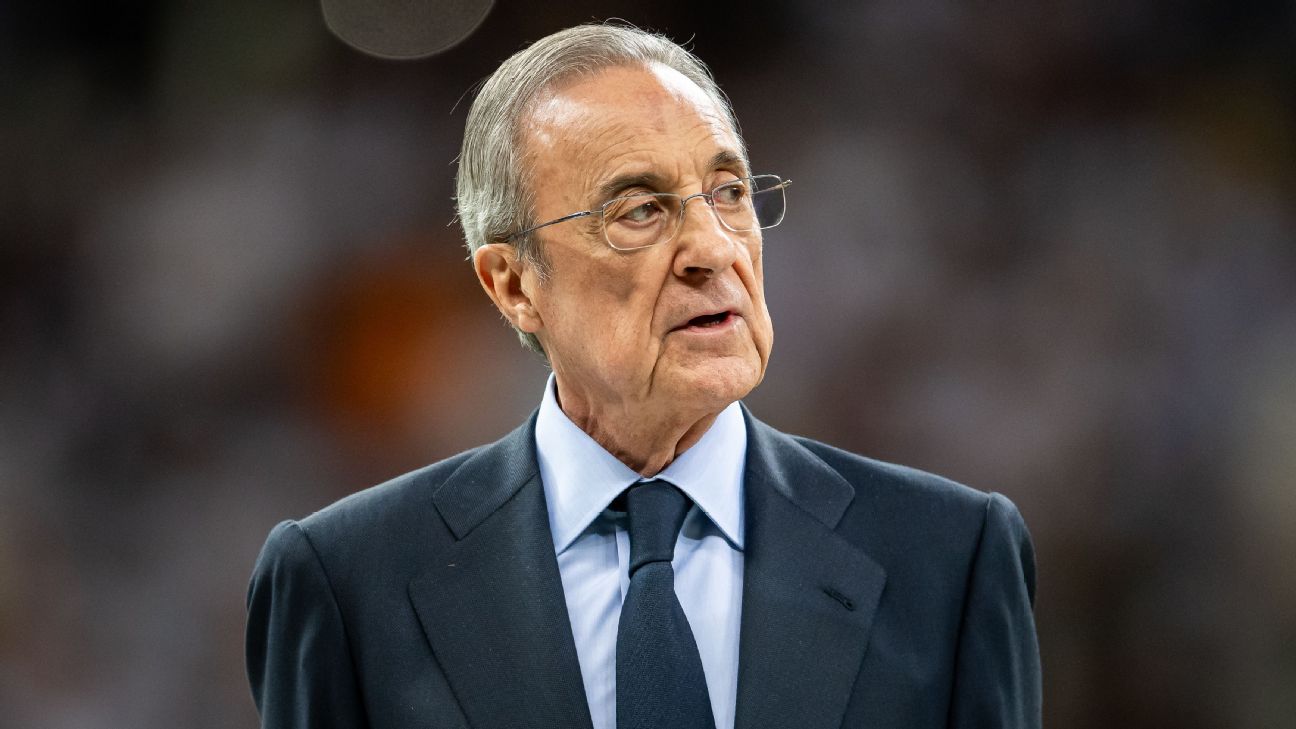AUCKLAND, New Zealand — The task for U.S. women’s national team coach Vlatko Andonovski seemed simple: start the best possible lineup and begin the Women’s World Cup with a strong statement of intent.
But once the squad to take on Vietnam in their tournament opener was announced, it became clear Andonovski was not playing it safe or simple.
The question, which will be answered once this World Cup is said and done: is Andonovski overthinking it, or just being shrewd? The answer certainly didn’t come Saturday at Eden Park Stadium against Vietnam (a Friday night start for fans in the U.S.), nor was it expected to. The talent differential between the two sides is large enough that a fully second-choice U.S. squad would still have been expected to win.
The USWNT won 3-0, missing a slew of quality scoring chances in the process — 28 shots in all — and it almost didn’t matter who Andonovski put on the field.
– Meet the USWNT: What you need to know about all 23 players
– Team by team previews: What you need to know
But the U.S. coach appeared to be setting the stage for a tournament where the USWNT will be difficult to predict, and the notion of the “best possible lineup” will be less straight-forward than it seems. In previous World Cup editions it was easy to predict who a coach might start and where, but Andonovski has put together a squad without easy answers.
Julie Ertz — a player who had seemingly made the roster at the last possible moment as the solution at defensive midfielder after not playing competitive soccer for two years — started at center-back.
Ertz hasn’t started as a center-back since 2019, and hasn’t played the position with regularity since years before that. But when captain Becky Sauerbrunn was a late scratch for the World Cup because of a foot injury, Andonovski opted not to replace her with someone currently playing at the position.
“When we knew that Becky is not going to be able to make it, that’s something we started looking into even deeper,” he said after the game. “We had a conversation with Julie before we even tried, did a lot of work before we got into (pre-World Cup) camp in terms of video analysis.”
– Women’s World Cup: Landing page | Schedule | Rosters | News
And yet, Andonovski didn’t necessarily have a better choice, in part because of how he constructed his World Cup roster. He could’ve instead opted to start Alana Cook alongside Naomi Girma, but then he would’ve been left with a very inexperienced central defense. Cook has 25 caps, and Girma — who is the better defender — has only 16.
Having the experience of Ertz at more than 100 caps, especially to ease the nerves in the younger Girma, was logical. After all, the only other option on this World Cup roster is Emily Sonnett, a player who has spent more time for the USWNT at full-back than center-back.
Ertz didn’t look completely comfortable in the back in her return to the role. Vietnam barely threatened, so she wasn’t exactly under pressure, but with the ball at her feet she looked unsettled at times and took unnecessary risks. She played into the game though, looking more comfortable as it went on.
“I’m glad we made the decision and I know that the back line is just going to get better and better going forward,” Andonovski said, also declining to state whether Ertz would stay in that role.
Sophia Smith discusses her 2-goal performance in the United States’ 3-0 win over Vietnam.
Savannah DeMelo, a player who made the World Cup roster without having ever played for the U.S., was a surprise choice to start in the midfield, too. Before the match, Andonovski suggested the choice was based on her recent form, including a closed-door scrimmage against the Philippines here in New Zealand.
DeMelo is a playmaker who is capable of unlocking defenses and creating chances for her teammates. However, what Andonovski has done is built a World Cup squad that hasn’t played together much — in the case of DeMelo, she got one cap in the USWNT’s send-off coming into the World Cup opener.
That lack of time together showed. The Americans against Vietnam looked a version of what they’ve looked for much of the Andonovski era: static, sluggish and too reliant on individual flashes of brilliance.
Andonovski, for his part, is well of aware of the gamble he has taken and seems confident in his decisions, telling reporters after the match: “If you look at this team, it’s the first time that this 11 has been on the field together. They’ve never been on the field together in a game scenario for one minute, so to see some of the connections and combinations they were able to make was very positive.”
But he also admitted that this USWNT didn’t look like everything the group could be.
“If there’s one thing we need to do better besides finishing, it’s how can we help the players that are in a position to finish, giving them a little bit of service,” he said. “Whether it’s finding them on the right step or the proper foot, the final touch — the service before the finish.”
For a team as attack-oriented and eager to play on the front foot as the U.S., finishing and service are no small missing pieces.
The USWNT had 297 touches in the final third compared to Vietnam’s 20, but it largely wasn’t the free-flowing and dynamic attack we’ve seen from the United States in the past — Sophia Smith’s first goal the lone exception. They underperformed their expected goals of 4.34 — including due to Alex Morgan’s missed penalty — and struggled to use the flanks, trying to push through a congested middle.
And yet, everyone from the outside seemed to be expecting a redux of 2019, when the USWNT opened the World Cup with a 13-0 win over Thailand, the most lopsided result in Women’s World Cup history.
The day before Saturday’s game, a Vietnamese reporter asked Andonovski: “Are you going to crush us like against Thailand four years ago?” After the game, another Vietnamese reporter asked: “Did you expect to score more?”
It’s perhaps unfair to compare that match to this one — that Thailand team wasn’t as good or as disciplined as this Vietnam team. But this USWNT doesn’t seem to have the chemistry of that 2019 team, either.
“I definitely think it’s coming together,” said defender Emily Fox of the team cohesion. “In training, we can feel that it’s coming together and we’re just going to keep building off of that. It’s the first game of the tournament so we want to keep building off of this performance.”
For a squad that has had few reps together, the chemistry needs to come together quickly. Vietnam wasn’t able to punish the U.S. for its inability to click, but the Netherlands — the runner-up from the last World Cup — is next up in group stage play. The knockout rounds will be tougher.
As former USWNT coach April Heinrichs once said, “In coaching, you’re either a jackass or a genius.” The choices that Andonovski has made could be the ones that will be talked about for years to come — revered or mocked, depending on how the tournament goes.



